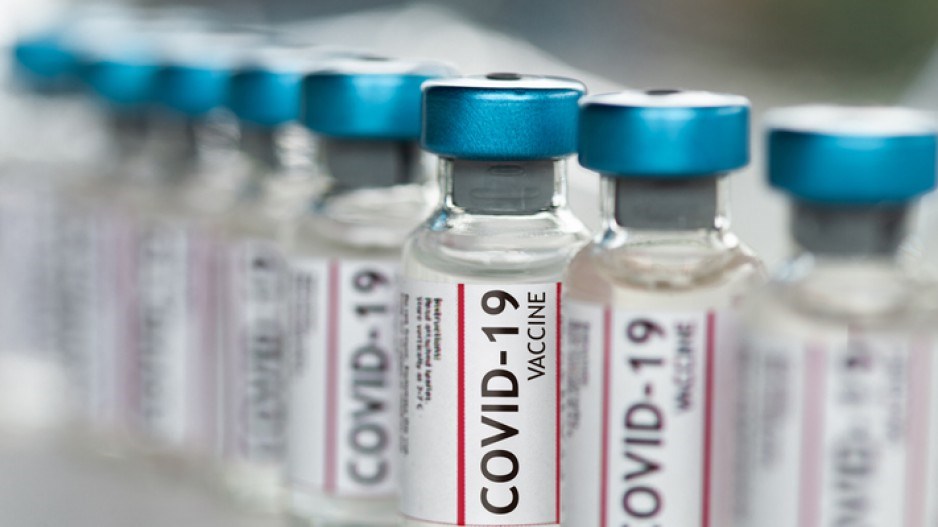With the first doses of COVID-19 vaccines rolling out across Canada Monday (December 14), B.C. companies have begun lining up for supporting roles in the distribution process.
One of the first orders of business will be prioritizing who has access to the vaccine and booking those Canadians for appointments to get the necessary shots.
Surrey-based Cambian Business Services Inc. is leading a joint project that has developed booking and management software that can co-ordinate between multiple organizations such as regional health authorities, clinics and private long-term care facilities.
“How do you line people up to say who is first in line, who's second line, who's one millionth in line?” Cambian Business Services CEO Bruce Forde said.
“It's about determining how to organize the prioritized authorization or basically saying, ‘It's your turn.’”
Project ABC, as it’s known, received $3 million in funding from the Digital Technology Supercluster along with a $1-million co-investment from partners including Vancouver-based Well Health Technologies Corp. (TSX:WELL), Tickit Health Ltd., Simon Fraser University and IBM Corp. (NYSE:IBM).
Forde said the booking component of Project ABC’s product will be instrumental in ensuring the vaccine rollout runs smoothly across different provinces and avoids large groups of Canadians from gathering at vaccine sites simultaneously.
“Lots of people who are working for us and want to work for us are thrilled about being able to do something that's so important,” he told BIV.
The consortium began collaborating in June 2020 and the software is set to launch on a wide scale as of March 31, 2021, as vaccination shifts from frontline workers and the most vulnerable to more of the general population.
Meanwhile, Jeff Allan, vice-president of Abbotsford’s Fraser Valley Dry Ice (FV Dry Ice Inc.), said his company is awaiting the go-ahead after being awarded a federal contract to manufacture and supply the dry ice needed to cool vaccines.
The just-approved vaccine from the Pfizer Inc. (NYSE:PFE) and BioNTech SE (Nasdaq:BNTX) must be stored at temperatures of -80C before it’s ready to be administered, while the competing Moderna Inc. (NYSE:MRNA) vaccine must be stored at -20C.
Fraser Valley Dry Ice will be supplying the dry ice to government agencies that will be storing vaccines upon delivery.
“If feels great. We’re proud to be part of the solution,” Allan told BIV.
The government has not yet disclosed to the B.C. company how much dry ice will be required.
But Allan said the government’s needs are expected to be fluid throughout the distribution process and his company can manufacture as much as 100,000 kilograms of dry ice per week.
Once informed of how much dry ice would be required on a given day, the company would then manufacture it and store it in thermal containers (some can hold as much as 1,100 kilograms) that would be delivered via a carrier dispatched by Fraser Valley Dry Ice.
“It sounds like they're going to need quite a bit of supply across the country,” Allan said, adding the procurement process with Ottawa went exceptionally fast, taking roughly a week.
Assuming a role in the distribution of the COVID-19 vaccines now seems poetic for his company, which launched just days before the pandemic shut down much of the economy back in March.
“We didn't know at that point — given everything that was going on— if our business was even going to make it,” Allan said.
“We survived that challenge and it's just great to know now that our product could be used to help keep people healthy and prevent the spread of the disease.”
Amid the pandemic, B.C. mining companies such as Imperial Metals Corp. have been supporting remote communities by offering everything from drums of hand sanitizer to assistance with medical care, according to Mining Association of B.C. president and CEO Michael Goehring.
The Globe and Mail reported last week that mining companies based in Ontario — Agnico Eagle Mines Ltd. (TSX:AEM) and Lundin Mining Corp. (TSX:LUN) — have expressed a willingness to deploy on-site medical staff to help administer the vaccine in Canada’s north as well as in South America.
“If we are asked, the mining industry is ready and willing to step up,” Goehring said, referring to B.C. companies.
It’s unclear to what extent provincial authorities have been tapping local businesses for support.
The Ministry of Health referred BIV to the B.C. Centre for Disease Control, which referred BIV to the Provincial Health Services Authority (PHSA) which referred BIV back to the Ministry of Health.
The Ministry of Health did not respond to a follow-up from BIV prior to publication.
In a follow-up email from the PHSA, spokesman Vincent Chou said “many” companies and organizations have been offering assistance with distributing the vaccine.
“We are in the planning phase and have not yet entered into discussion with anyone yet,” he said.
The federal government has enlisted FedEx Express Canada Corp. and Innomar Strategies Inc. to lead distribution efforts for vaccines like Moderna’s.
Pfizer will be responsible for delivering the vaccine directly to vaccination sites due to the cold temperatures at which the doses must be stored prior to administration.




